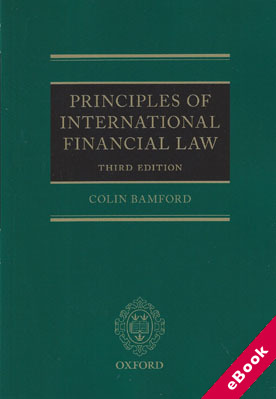
The device(s) you use to access the eBook content must be authorized with an Adobe ID before you download the product otherwise it will fail to register correctly.
For further information see https://www.wildy.com/ebook-formats
Once the order is confirmed an automated e-mail will be sent to you to allow you to download the eBook.
All eBooks are supplied firm sale and cannot be returned. If you believe there is a fault with your eBook then contact us on ebooks@wildy.com and we will help in resolving the issue. This does not affect your statutory rights.
This book explains the legal principles, rules, concepts, and developments that underpin the practice of financial law in common law countries, and by extension across the world.
One of the aims of the book is to explain clearly the basis of the concepts applied by the common law to financial transactions. As part of this aim the third edition analyses in detail the interface between common-law and civil law approaches in areas such as the distinction between property and personal rights. The section on the ability of States to control the use of their money has also been substantially rewritten to address increasing demands in the US that sanctioned persons and states should be denied access to the US monetary system, recording both the increased incidence of activity by the US authorities, and also explaining in more detail the rationale of these actions.
Since the last edition was written there have been a number of developments in the technology used in the financial markets that question the legal principles on which they operate. In particular, the impact of Distributed Ledger Technology (e.g. Blockchain) on the transfer of intangible assets and the effect on the rights of parties involved is considered from both a legal and practical position. Additionally, the legal implications of the use of cryptocurrencies, including their use as Initial Coin Offerings, are also considered.
This is an essential work for both experienced lawyers and those who are relatively new to international financial law. It provides the more experienced lawyer with an aide memoire on the existing law and a reference source for new ideas when tackling innovative structures or products. For those new to practice or postgraduate students this book delivers a firm foundation upon which to build knowledge of the law and practice of financial law.